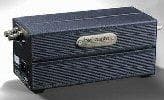
Bel Canto DAC-1
Value For Money
Bel Canto DAC-1
When you purchase through links on our site, we may earn an affiliate commission. Here's how it works.

User Reviews
Value For Money
Emil Scholz Multibit Usb Audio Dac
Emil Scholz ESD series DACs based on two multibit Burr Brown/Analog Devices PCM63P-K/PCM1704/AD1862 chips and equipped with ADAT interface and I2S LVDS input.
In the box
ESD-6300 DAC
Toslink cable
HDMI cable for I2S
Power supply
Audio RCA cable
3.5mm to 2xRCA audio cable
USB cable
Manual
Review
The DAC is very compact, made of anodized aluminum, all controls can be reached by push/turn encoder. Maximum sample rate is 96k, word length is 24 bit (digital filter and all inputs), 20 bit digital to analog (galvanic isolated) section. Optional replaceable module can be used to upgrade 20-bit version (PCM63 or AD1862 based) into advanced 24-bit PCM1704 DACs. The volume control is fully digital and has 100 steps. Output level is not trimmable, nominal level is -10dBv.
The LCD screen displays all the necessary information - selected input, sample rate, channel mode, output phase mode, digital filter mode, emphasis, errors etc. The control of the DAC is very easy - just push or turn the encoder to achieve all the settings control. Stereo bargraph displays output or input aux level in dB.
Connections
The DAC has four digital inputs - optical s/pdif, coaxial s/pdif, USB, LVDS I2S (can be configured for any format such as 16-24 bit 'classic' I2S or left or right justified digital source - manually or automatically, the LVDS TX board should be ordered separately).
An additional 3.5mm auxiliary input allows connecting audio source with 2Vrms maximum level of signal. Headphone output has 250mW output power @ 30 ohms impendence. If your model is equipped with ADAT board you can connect an 8-channel ADAT source to this DAC (only two stereo pairs or ADAT channels 1/2, 3/4, 5/6 or 7/8 can be played). When USB mode is selected the optical input can be used as digital input from external source to computer. Output is RCA left and right jack.
Audition
Source - Audio Research CD6 player, amplifier - Sony TA-A1 + KEF Reference 1. Headphones - Sennheiser HD 380 Pro. CD used - Pink Floyd 'The Wall', Michael Jackson 'Man In Black II', The String Quartet Tribute to Led Zeppelin, Natalie Cole 'Leavin', classic music (Rachmaninov Vocalise transcribed for violin and piano, Mozart Requiem Mass in D minor). Audition took place in a room equipped as a home studio.
Sound
Classic balanced Burr Brown PCM63 sound without any artifacts. Headphones output is powerful, the volume reserve is enough. I liked headphones and line out sound. The DAC played all my recordings with good quality in my opinion.
Conclusion
A pretty good DAC for home and studio usage. Compact size, clear sound, easy control and additional futures such as R2R PCM63/1704/AD1862 DAC, multiformat LVDS I2S and ADAT support makes this DAC a very interesting model in the modern delta-sigma market.
The Rating I Give The Bel Canto Dac-1 Is Somewhat
The rating I give the Bel Canto DAC-1 is somewhat abitrary for several reasons.
I have had opportunity to compare it with only a couple of other DACs, so there
may well be other units out there just as fine. More importantly, the amazing
performance of this DAC opens up the question of what constitutes a well designed
DAC? Is it the upsampling to 96K? The dithering to 24 bits? The relatively high
frequency of the digital filter (48K)? The very expensive precision components? The
isolation of ground planes? The compactness and short signal path runs? The latest
chip technology? The elimination of the typical PLL and reclocking circuitry? I don't
know, and possibly neither do Bel Canto. They did a lot of things right, and had the
advantage of the latest chipsets. The result is a stunning improvement in definition
and detail and imaging, not the typical subtleties one struggles for with a new
piece of electronics. Highly recommended.
I own a Bel Canto DAC 2.0. My experience is consistent with what I read in the review.
My Bel Canto reduces the "graininess" of most of my CDs (some are just beyond help), noticeably sweetens the sound of strings and improves the detail of the sound without making it harsh or overly analytical. I have Magnepan speakers, which readily reveal nasty sounding CDs. The Bel Canto really improves the sound and makes listening much more enjoyable.
Steve Hackensack NJ USA
Q&A
There are no questions yet. Be the first to ask a question.